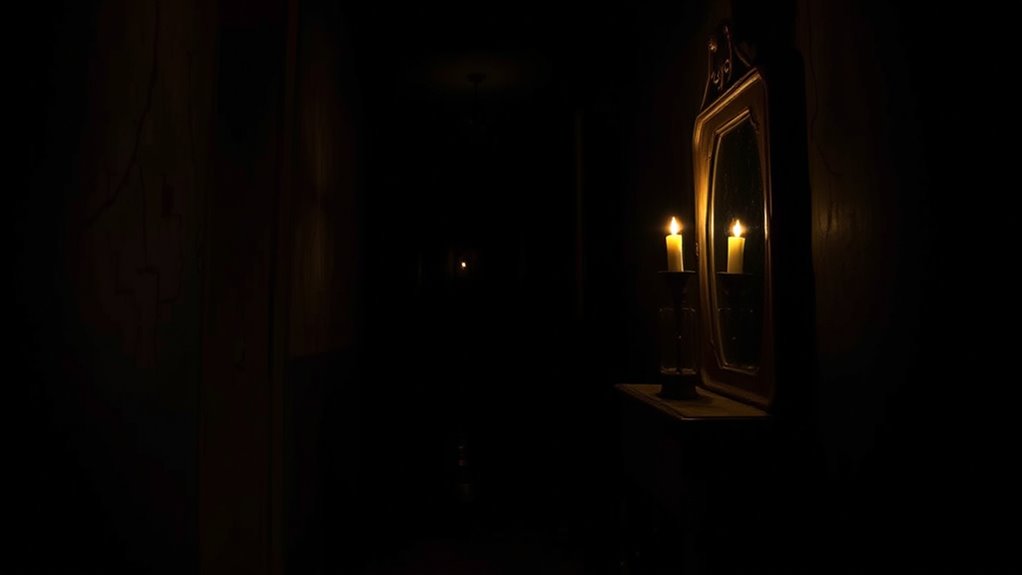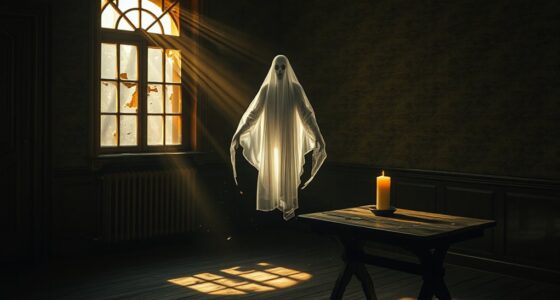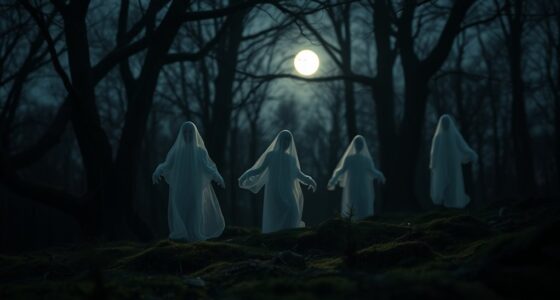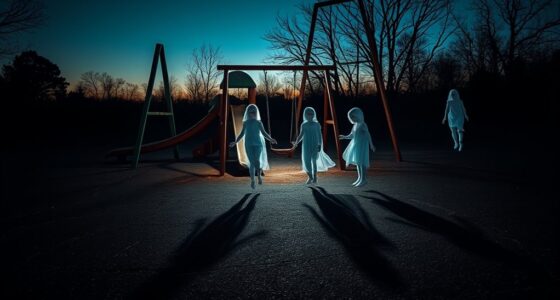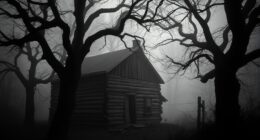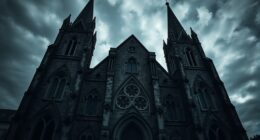Hauntings mainly happen at night because darkness heightens your fear and anxiety, making you more sensitive to sounds and movements. Cultural beliefs link the nighttime to ghostly activity, often dubbed the “witching hour.” As your body enters REM sleep, your mind can amplify these experiences, enhancing the feeling of presence. Plus, environmental factors, like silence and reduced visibility, contribute to eerie perceptions. There’s much more to uncover about the reasons behind these nighttime phenomena.
Key Takeaways
- Darkness heightens fear and anxiety, making individuals more susceptible to interpreting ordinary sounds as paranormal activity.
- Cultural beliefs associate nighttime with hauntings, reinforcing the idea that spirits are more active during the “witching hour.”
- Environmental stillness at night amplifies awareness of subtle sounds and movements, contributing to feelings of unease.
- Reports of ghostly encounters peak during specific nighttime hours, especially between 2:00 am and 4:00 am.
- Media portrayal of ghost hunting at night enhances societal perceptions that darkness is linked to supernatural phenomena.
The Psychological Impact of Darkness
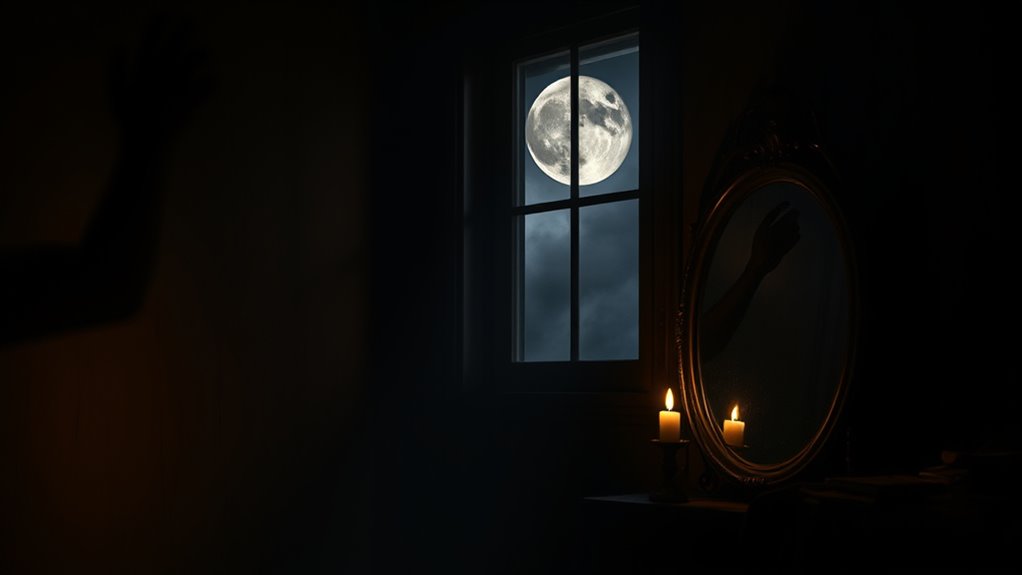
As night falls, your mind may start to play tricks on you, heightening fear and anxiety in response to the darkness.
Humans are wired to detect threats in low-light conditions, making you more alert to potential dangers. This heightened state can amplify your emotional reactions, causing you to interpret ordinary sounds as paranormal activity.
Our brains are primed to sense danger in the dark, heightening our emotional responses and leading us to perceive the ordinary as eerie.
The phenomenon of pareidolia comes into play, where your brain might misinterpret shadows or shapes, leading to ghostly misperceptions.
Cultural narratives and media often reinforce the idea that night is a prime time for supernatural events, conditioning you to expect something eerie.
These psychological factors shape your experience of nighttime, intensifying the unsettling feelings that can arise in the dark. Engaging in mindfulness practices can help ground your emotions and reduce fear as you navigate the darkness.
Cultural Beliefs Surrounding Nighttime Hauntings
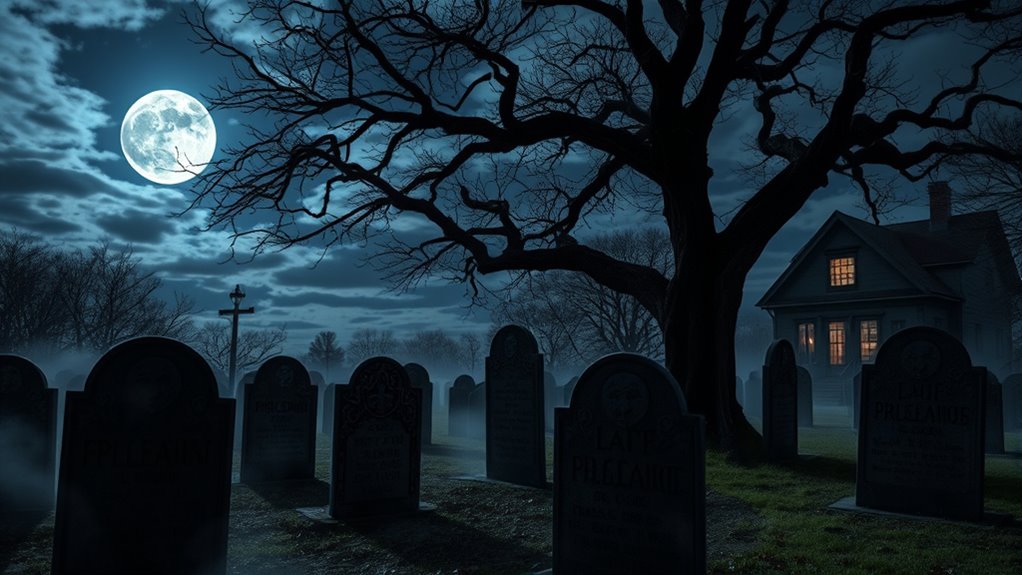
Nighttime has long been steeped in cultural beliefs that amplify the idea of hauntings and supernatural occurrences. Many cultures associate this time with heightened ghostly activity, especially during the so-called “witching hour” between 12:00 am and 1:00 am.
Literature and media reinforce this perception, often portraying paranormal events unfolding in the dark. Such narratives contribute to the belief that spirits are more likely to manifest at night, as folklore suggests the veil between the living and the dead is thinner after dark.
This cultural backdrop feeds into social norms around ghost investigations, where the quiet and darkness create an environment thought to enhance the chances of encountering the supernatural. You may find yourself more alert to the eerie possibilities that nighttime brings.
The Biological Response to Nighttime Investigations

When you venture out for nighttime investigations, your body reacts in fascinating ways.
Your circadian rhythm shifts, making you more sensitive to sounds and movements, while sleep disturbances can amplify feelings of anxiety.
This heightened awareness and emotional response can greatly shape your experience and interpretation of potential hauntings.
Circadian Rhythm Effects
Though you may be drawn to the eerie allure of nighttime investigations, your body’s circadian rhythm plays an essential role in how you experience these moments.
During the witching time of night, your brain enters peak REM sleep between 2:00 AM and 4:00 AM, heightening dream activity and making you more susceptible to sleep disturbances.
With lower cortisol levels, feelings of fear and anxiety can intensify, leading you to interpret ordinary sounds as supernatural.
Additionally, slower heart rates and irregular breathing patterns can leave you disoriented if you awaken suddenly.
This agitation often amplifies emotional responses, causing you to perceive even harmless sensations as ghostly encounters, ultimately shaping your nighttime experience in profound ways.
Heightened Sensory Awareness
How does the darkness affect your senses during those spine-tingling investigations?
At night, your senses sharpen, making you more aware of subtle changes in light and sound. This heightened awareness can turn ordinary noises into eerie whispers, amplifying your experience of paranormal activity.
Psychological factors like fear of the dark can intensify your emotional responses, increasing sensitivity to unusual phenomena. The quiet environment, free from daytime distractions, allows you to focus more intently on potential ghostly encounters.
Additionally, pareidolia kicks in, causing your brain to interpret random stimuli as familiar shapes or sounds, enhancing your perception of the supernatural.
In this heightened state, time seems to stretch, making each moment feel charged with possibility.
Sleep Disturbances Impact
While the thrill of nighttime investigations can be exhilarating, sleep disturbances often complicate the experience. During the witching hour, your circadian rhythm influences REM sleep cycles, making nightmares and sleep paralysis more likely. These disturbances can trigger anxiety and disorientation, which you might mistake for paranormal encounters.
| Time Frame | Effects on Sleep Disturbances | Potential Misinterpretations |
|---|---|---|
| 12:00 – 1:00 am | Increased agitation | Ordinary sounds perceived as ghosts |
| 1:00 – 3:00 am | Peak melatonin levels | Heightened sensory perceptions |
| 3:00 – 4:00 am | Lower cortisol, immune response | Hallucinations and fear |
The quietness at night amplifies your brain’s receptiveness, further blurring reality and perceived activity.
The Role of Environmental Factors
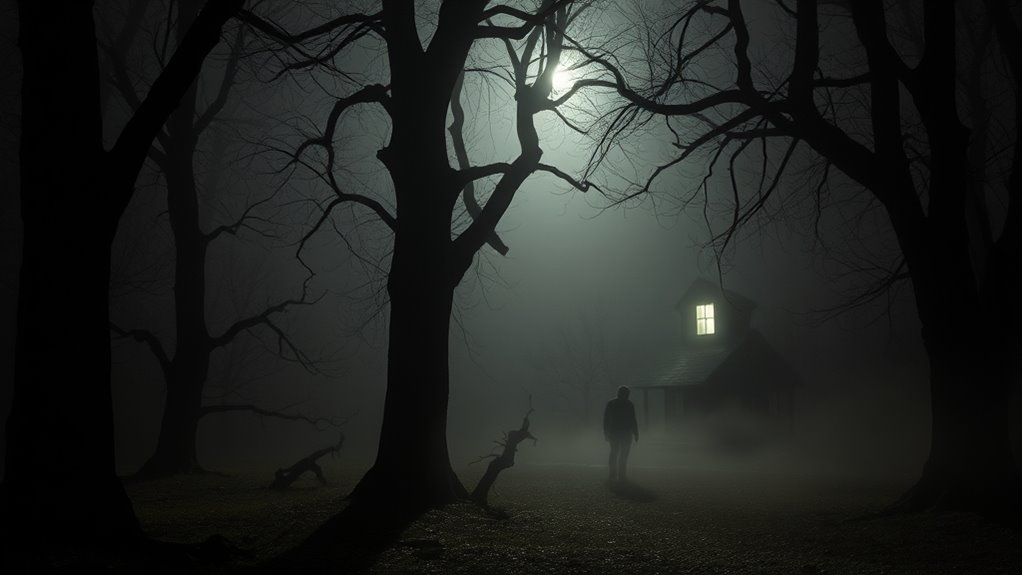
At night, the silence and stillness create an eerie atmosphere that heightens your senses.
The darkness amplifies your perception, making every creak and rustle feel like a potential ghostly encounter.
This combination of quiet and obscurity can stir feelings of fear, leading you to interpret ordinary sounds as something supernatural.
Nighttime Silence and Stillness
As night falls and the world quiets, the absence of everyday noise creates an eerie stillness that can heighten your senses. This nighttime silence and stillness plays a key role in how you perceive your environment, especially when it comes to potential paranormal activity.
Here are a few factors to contemplate:
- Reduced External Disturbances: With less traffic and human activity, you can focus more on subtle sounds that might otherwise go unnoticed.
- Heightened Awareness: The quiet amplifies your awareness, making you more sensitive to movements that could hint at supernatural occurrences.
- Cultural Associations: Stories and beliefs about the dark often paint it as a domain of fear, influencing how you interpret what you experience.
These elements combine to create an atmosphere ripe for ghostly encounters.
Darkness Amplifies Perception
When darkness envelops the surroundings, your senses sharpen, making you more attuned to the faintest changes in your environment. This heightened awareness, combined with the quietness of night, allows you to notice subtle sounds and movements that might go unnoticed during the day. Cultural narratives link darkness with fear, amplifying your emotional responses to what you perceive. Biological sensitivity to temperature and pressure also plays a role, intensifying your experiences. The table below summarizes key factors contributing to how darkness amplifies perception:
| Factor | Effect on Perception | Example of Experience |
|---|---|---|
| Enhanced Sensitivity | Increases awareness of stimuli | Noticing creaking noises |
| Psychological Effects | Heightens fear and imagination | Interpreting shadows as figures |
| Environmental Silence | Reduces competing noises | Hearing distant whispers |
| Cultural Conditioning | Links darkness with supernatural | Feeling uneasy in dark places |
| Biological Response | Heightened sensitivity at night | Feeling temperature changes |
Increased Sensory Perception at Night
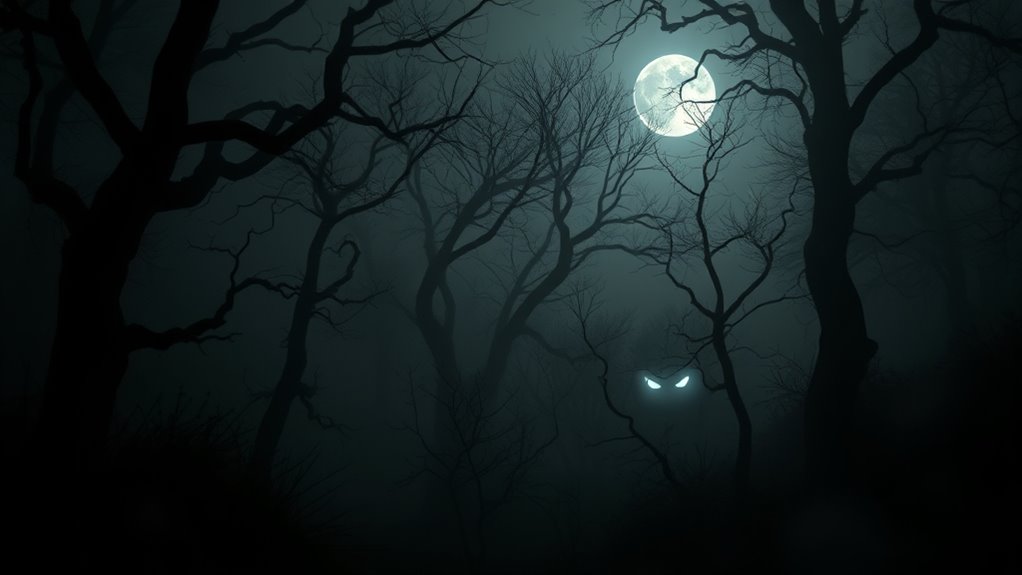
Though nightfall casts shadows that can evoke fear, it also sharpens your senses, making you more aware of subtle changes around you.
When you’re active at night, you might notice:
- Enhanced Hearing: The quietness of nighttime amplifies sounds, allowing you to catch whispers or creaks that would go unnoticed during the day.
- Heightened Sight: Your eyes adjust to darkness, making you more sensitive to variations in light and shadow, possibly revealing shapes that spark your imagination.
- Increased Awareness: You become more attuned to temperature and pressure changes, which could feel eerie or unsettling, heightening your sense of unease.
This sensitivity can lead to experiences that feel otherworldly, making nighttime an intriguing, albeit spooky, time to explore.
Paranormal Activity and the Witching Hour
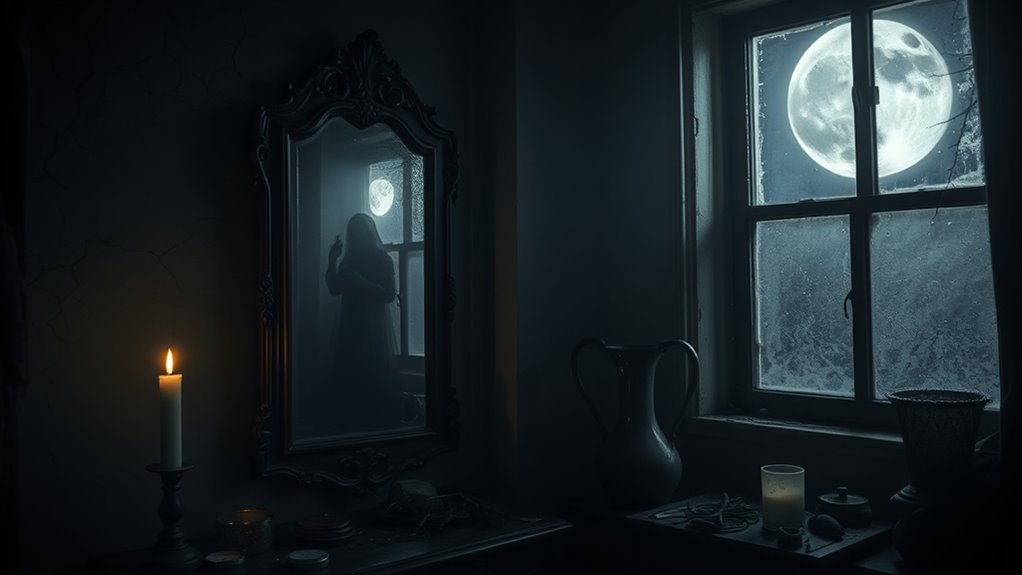
What is it about the stillness of night that seems to awaken the supernatural? The witching hour, traditionally from 12:00 am to 1:00 am, is when ghostly activity peaks. This time aligns with your body’s REM sleep cycle, making you more susceptible to paranormal experiences. Reports of hauntings often surge between 2:00 am and 4:00 am, reflecting a blend of psychological and physiological factors.
| Time Frame | Activity Level |
|---|---|
| Midnight | Shift to Ghost Hour |
| 1:00 am | Heightened Awareness |
| 2:00 am | Peak Reports |
| 3:00 am | Witching Hour |
These late-night hours, steeped in cultural narratives, amplify your fears and perceptions of the unknown.
Fear and Anxiety as Catalysts for Ghost Sightings
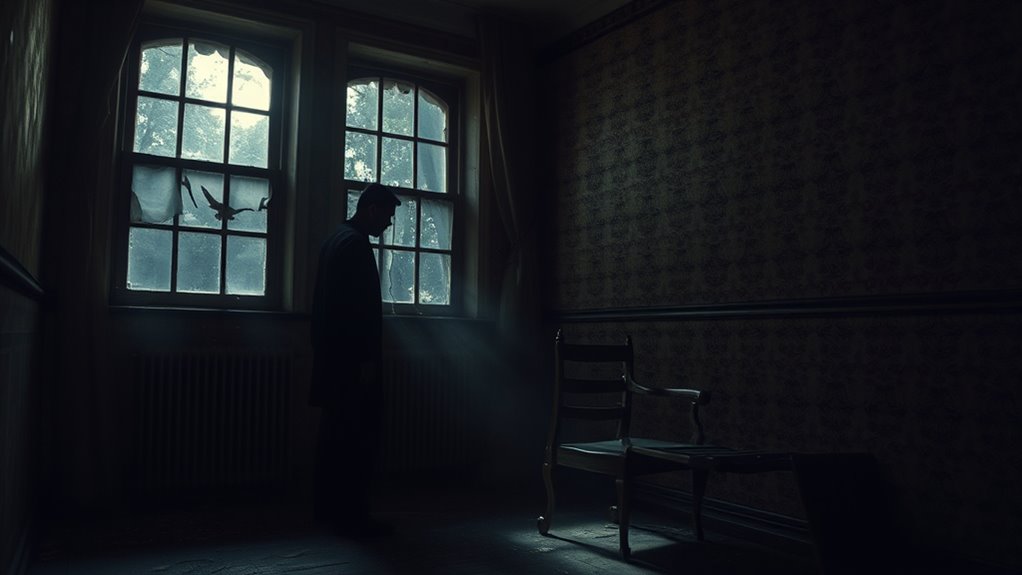
The stillness of night, combined with the natural fear of darkness, amplifies your emotional responses and can lead to heightened experiences of paranormal activity.
The quiet of night enhances our fears, heightening emotional reactions and opening the door to perceived paranormal encounters.
When you’re anxious, your brain becomes hyper-aware, misinterpreting ordinary sounds and movements as potential threats. This can result in ghost sightings based on a few psychological factors:
- Biological Programming: Humans are wired to fear the dark, heightening emotional responses.
- Cultural Narratives: Stories and media reinforce the idea that ghosts are more active at night, increasing your anxiety.
- Pareidolia: In darkness, your brain may perceive familiar shapes, causing you to see ghostly figures.
This fear and anxiety can disrupt your sleep, making you more susceptible to experiences that seem otherworldly. Additionally, the adjustable pressure settings of airless paint sprayers can create smooth finishes, much like how heightened emotional responses can create vivid experiences in the mind.
The Influence of Media on Nighttime Investigations
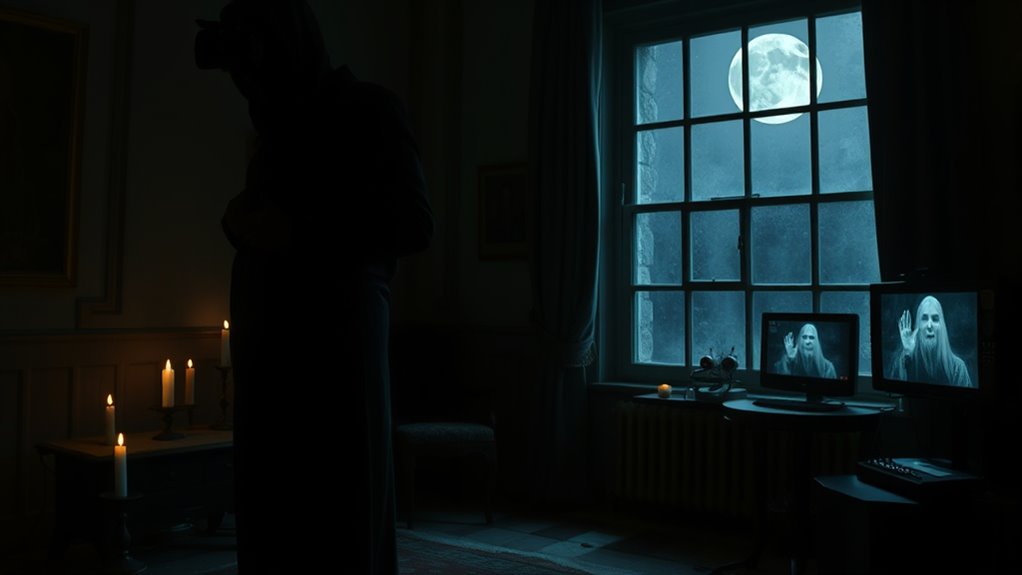
As media increasingly portrays nighttime as the prime time for ghostly encounters, it shapes your expectations and experiences during paranormal investigations.
Popular horror films and television shows often depict ghosts as more active after dark, reinforcing the belief that nighttime is when the supernatural thrives. Literature and folklore contribute to this notion, framing darkness as a period ripe for paranormal occurrences.
Reality TV further cements this idea, scheduling investigations at night to heighten tension and influence your perception of ghost activity. This prevalence of nighttime ghost hunting creates a social norm associating darkness with fear and the unknown.
Consequently, you might find yourself drawn to seek out supernatural experiences in the shadows, expecting significant encounters to unfold until dawn.
Practical Considerations for Ghost Hunting at Night
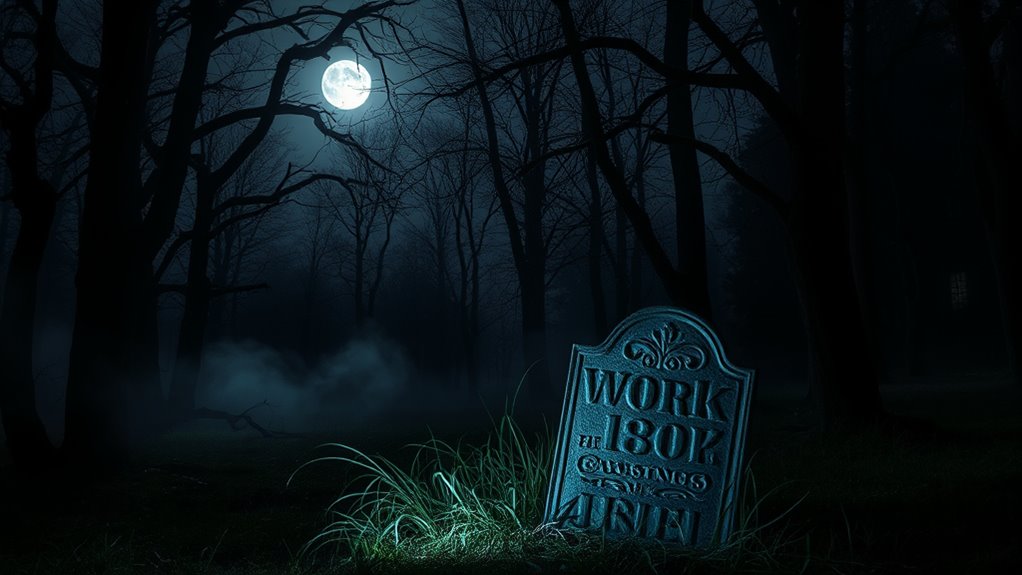
While many believe nighttime is the best time for ghost hunting, practical considerations should guide your investigations.
When you’re investigating at night, keep these factors in mind:
- Safety First: Make sure you have proper lighting and navigation tools. Dark locations can be hazardous, so avoid tripping hazards and know your surroundings.
- Equipment Readiness: Bring fully charged batteries and backup equipment. Cold temperatures can drain batteries quickly, potentially cutting your investigation short.
- Controlled Environment: Minimize external noise and distractions. Limit the number of people present to enhance your focus and improve the clarity of your observations.
Frequently Asked Questions
Why Are Ghost Hunts Done at Night?
Ghost hunts are done at night for several reasons. You’ll find that the darkness minimizes external distractions, allowing you to focus on any strange sounds or movements.
It heightens your senses, making it easier to perceive subtle paranormal activity. Plus, many haunted locations are closed to the public during nighttime, giving you a controlled environment.
The thrill of the dark also adds excitement, enhancing your emotional responses and experiences during the investigation.
Why Do Paranormal Things Happen at 3AM?
When the clock strikes three, shadows seem to dance and whispers echo through the stillness.
You might notice that paranormal happenings often spike around this hour. This time, known as the witching hour, is thought to blur the lines between worlds.
Your body, flooded with melatonin, sharpens your senses, making you more attuned to the unseen.
With darkness enveloping you, fears intensify, heightening your awareness of anything that goes bump in the night.
Why Is Everything More Scary at Night?
Everything feels scarier at night because your brain’s wired to detect threats in low light.
As darkness sets in, your senses sharpen, making you more aware of subtle sounds and movements. This heightened awareness amplifies fear, especially with the cultural belief that nighttime is when spooky things happen.
Coupled with psychological conditioning and the tendency to misinterpret shadows, your imagination runs wild, making every creak and rustle seem more ominous than during the day.
Why Do I Keep Imagining Scary Things at Night?
You keep imagining scary things at night because your brain’s wired to detect threats in low light. This heightened awareness can make ordinary sounds seem terrifying.
Plus, cultural narratives and media fuel your fears, making you expect the supernatural. Reduced external stimuli at night can amplify anxiety, leading your mind to fill in gaps with frightening thoughts.
Sleep disturbances and the fear of darkness only add to this cycle, intensifying your nighttime imaginings.
Conclusion
In the stillness of night, when shadows stretch and whisper, it’s easy to feel that chill down your spine. Like a moth drawn to a flickering flame, your curiosity about hauntings pulls you into darkness. As fear and fascination intertwine, remember that the night amplifies your senses, revealing what daylight often obscures. Whether it’s the creak of a floorboard or a fleeting shadow, embrace the mystery; the night may just be a portal to the unknown.
